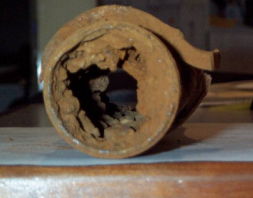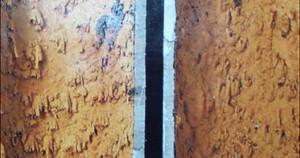This article focuses on water quality in the various systems in your building, the importance of a regular water treatment schedule, and steps you can take if your system has not seen proper care in some time. The exterior of your mechanical system offers constant reminders of its need for maintenance; however, equally as important is managing the inside of your building’s pipes. Staying on top of the chemistry of the water in your building loops and performing regular maintenance will add years of trouble-free performance to your systems and save you money.
District Energy has an extensive water treatment program for its heating and cooling distribution system. Your service interface with District Energy is through an on-site heat exchanger(s) that separates the District Energy closed-loop system from your building water loop. District Energy’s treated water does not commingle with your building’s heating loop, therefore, your water needs to be monitored and chemically treated independently.
 A water treatment plan for your system will help to address a variety of issues that can damage pipes or hinder performance. The building’s closed-loop system must be sealed from the atmosphere to ensure that the water remains free of oxygen and carbon dioxide, which can lead to corrosion. The system must also provide for neutralization of water hardness agents, as well as protection from harmful gases in the make-up feed water. Even in the most efficient systems, water loss can result from leaking seals in valves, pumps, and expansion tanks, or other causes requiring the introduction of make-up water to satisfy the minimum system pressure required to serve the building. Feed water must have additional treatment to prevent the effects of deposits and corrosion and ensure that the pH value of the loop is maintained.
A water treatment plan for your system will help to address a variety of issues that can damage pipes or hinder performance. The building’s closed-loop system must be sealed from the atmosphere to ensure that the water remains free of oxygen and carbon dioxide, which can lead to corrosion. The system must also provide for neutralization of water hardness agents, as well as protection from harmful gases in the make-up feed water. Even in the most efficient systems, water loss can result from leaking seals in valves, pumps, and expansion tanks, or other causes requiring the introduction of make-up water to satisfy the minimum system pressure required to serve the building. Feed water must have additional treatment to prevent the effects of deposits and corrosion and ensure that the pH value of the loop is maintained.
 If your heating system is idle during the summer, water treatment becomes that much more critical. Stagnant, untreated water leads to corrosion and can also be a breeding ground for bacteria and biological growth. With properly treated water, you can avoid solid build-up on the heat transfer surfaces of the heat exchangers, eliminate pipe corrosion, and reduce fouling in the closed loop. To avoid pipe damage and keep your building systems running at optimal performance, it is imperative that operating engineers have the water circulating in the building’s heating loop checked by a chemical treatment consultant and maintain a regular testing and treatment schedule.
If your heating system is idle during the summer, water treatment becomes that much more critical. Stagnant, untreated water leads to corrosion and can also be a breeding ground for bacteria and biological growth. With properly treated water, you can avoid solid build-up on the heat transfer surfaces of the heat exchangers, eliminate pipe corrosion, and reduce fouling in the closed loop. To avoid pipe damage and keep your building systems running at optimal performance, it is imperative that operating engineers have the water circulating in the building’s heating loop checked by a chemical treatment consultant and maintain a regular testing and treatment schedule.
If you have questions about your building’s water treatment program, please contact the District Energy team at 651.297.8955, email info@districtenergy.com, or support request form.